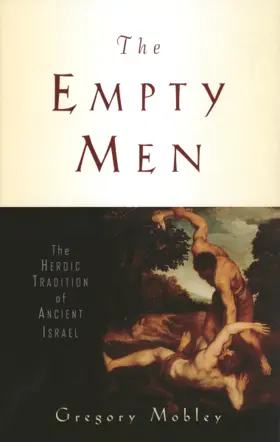

The Empty Men: The Heroic Tradition of Ancient Israel
in Anchor Yale Bible Reference Library
Pages
320
Publisher
Yale University Press
Published
12/13/2005
ISBN-13
9780300140125
In a ground-breaking work of literary archaeology, a bold young scholar adds a new page to the quintessential book of adventure stories, that of the heroic traditions of the Old Testament.
Gregory Mobley brings a highly original eye to the familiar stories found in Judges, which depict Israel’s frontier era, and in First and Second Samuel, which portray the ragged and violent emergence of kingship in Judah and Israel. From Ehud’s mission into an inaccessible Moabite palace to the triumph of Gideon and his elite squadron against a Midianite swarm, from the gangland epic of the warlord Abimelech’s rise and fall to the narrative of Samson, Israel’s great outlaw-hero, Mobley rescues these stories from their theologically minded biblical editors and traditional interpreters. Mobley draws upon Semitic and European heroic traditions about warriors and wild men, and upon Celtic, Anglo-American, and African-American balladry about borderers and outlaws, to dig out the heroic themes submerged in biblical adventure stories.
The Empty Men describes the process by which adventure stories—replete with foolish love, warfare, assassinations, ritual slaughter, and grim masculine codes—were transformed into sermons and history lessons. Mobley also offers reflections on the Iron Age theology of these narratives, with their emphasis on poetic justice, and on the mythic dimensions of landscape in these stories. Mobley is sure to attract much attention in the scholarly community for his raw portrayals of biblical heroes, for his unblinking attention to the martial codes and the warrior subculture of ancient Israel, and for his bittersweet reflections on the theological and ethical significance of this corpus of adventure stories that are under the surface—but close to the bedrock—of the many mansions that Judaism and Christianity have built in subsequent centuries on these foundational texts.
Gregory Mobley brings a highly original eye to the familiar stories found in Judges, which depict Israel’s frontier era, and in First and Second Samuel, which portray the ragged and violent emergence of kingship in Judah and Israel. From Ehud’s mission into an inaccessible Moabite palace to the triumph of Gideon and his elite squadron against a Midianite swarm, from the gangland epic of the warlord Abimelech’s rise and fall to the narrative of Samson, Israel’s great outlaw-hero, Mobley rescues these stories from their theologically minded biblical editors and traditional interpreters. Mobley draws upon Semitic and European heroic traditions about warriors and wild men, and upon Celtic, Anglo-American, and African-American balladry about borderers and outlaws, to dig out the heroic themes submerged in biblical adventure stories.
The Empty Men describes the process by which adventure stories—replete with foolish love, warfare, assassinations, ritual slaughter, and grim masculine codes—were transformed into sermons and history lessons. Mobley also offers reflections on the Iron Age theology of these narratives, with their emphasis on poetic justice, and on the mythic dimensions of landscape in these stories. Mobley is sure to attract much attention in the scholarly community for his raw portrayals of biblical heroes, for his unblinking attention to the martial codes and the warrior subculture of ancient Israel, and for his bittersweet reflections on the theological and ethical significance of this corpus of adventure stories that are under the surface—but close to the bedrock—of the many mansions that Judaism and Christianity have built in subsequent centuries on these foundational texts.